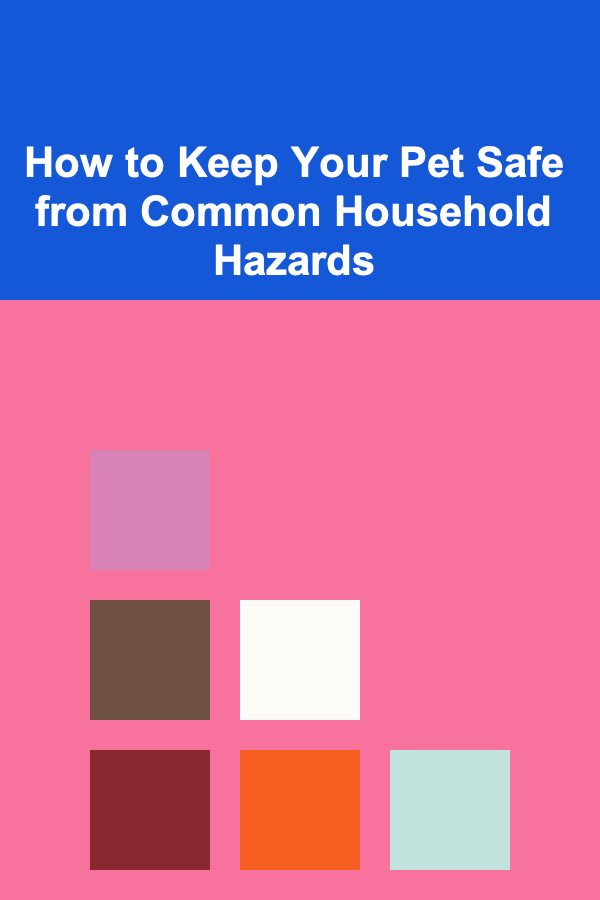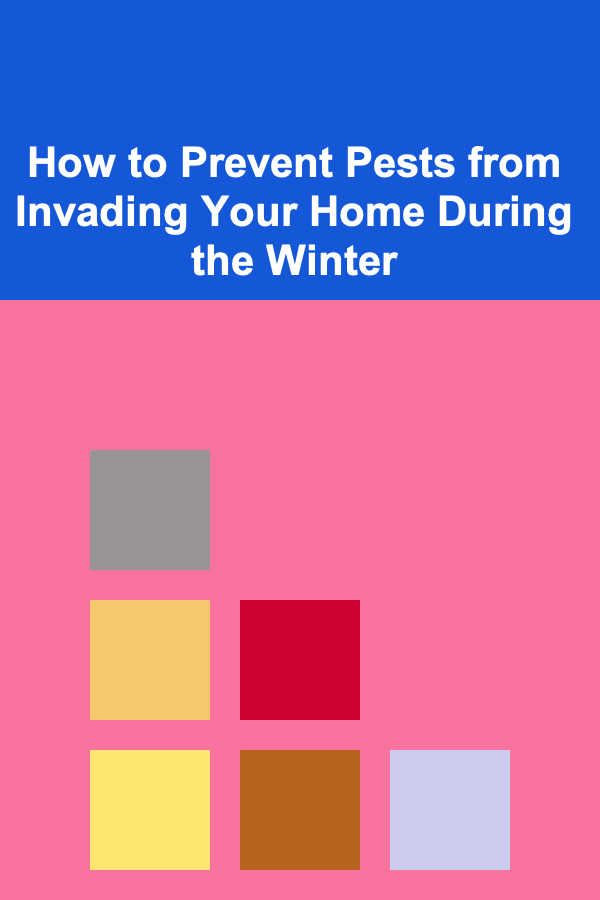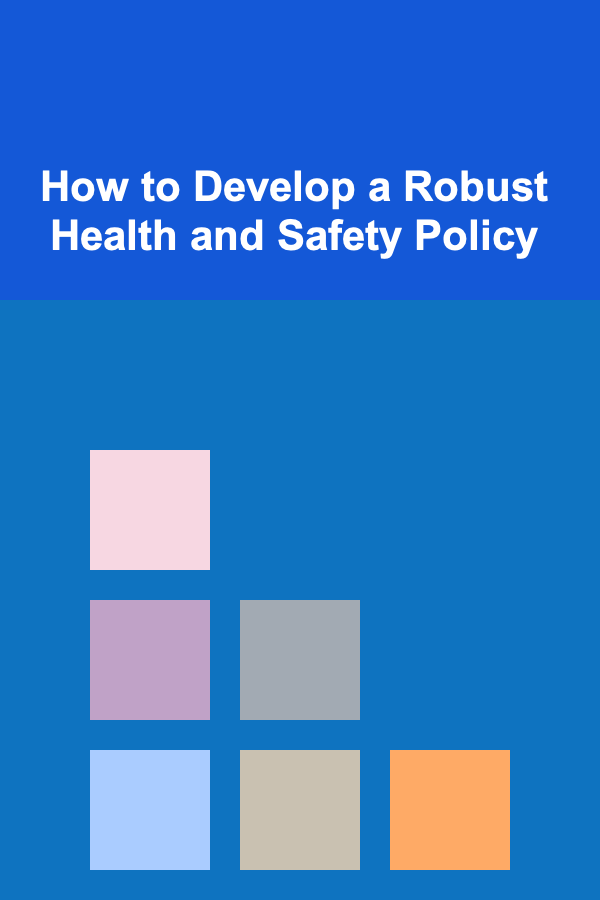
How to Keep Your Pet Safe from Common Household Hazards
ebook include PDF & Audio bundle (Micro Guide)
$12.99$7.99
Limited Time Offer! Order within the next:

Our homes are meant to be safe havens for both ourselves and our pets. Yet, despite our best intentions, there are many hazards in the household that can pose serious risks to our furry companions. From toxic foods and chemicals to common household items that may seem harmless, there are plenty of dangers lurking in our everyday environments. The good news is that with awareness and precaution, we can significantly reduce the risks and keep our pets safe.
This comprehensive guide aims to address the common household hazards that pose a danger to pets and provide actionable steps that every pet owner can take to ensure their pet's safety. Whether you have a dog, cat, or another pet, this guide offers essential advice on preventing accidents, poisoning, and injuries in the home.
Toxic Foods and Plants
1.1 Toxic Foods for Pets
Many of the foods we enjoy as humans can be harmful, or even deadly, to pets. Some common food items, often found in the kitchen, pose a severe risk to pet health. These include:
Chocolate
Chocolate is perhaps the most well-known toxic food for pets. The substance known as theobromine, found in chocolate, is highly toxic to dogs, and to a lesser extent, cats. Even small amounts can cause severe symptoms like vomiting, diarrhea, seizures, and, in extreme cases, death.
Grapes and Raisins
Grapes and raisins are another food that can lead to acute kidney failure in pets, particularly in dogs. While the exact substance that causes the toxicity remains unknown, it is best to avoid giving these foods to any pet.
Onions and Garlic
Onions, garlic, and other members of the allium family can cause damage to your pet's red blood cells, leading to anemia. Both raw and cooked forms of these foods can be toxic, so it's essential to keep them out of your pet's reach.
Xylitol (Artificial Sweetener)
Xylitol is a sugar substitute found in many sugar-free products, including gum, candy, baked goods, and even peanut butter. Ingesting xylitol can cause a dramatic drop in blood sugar, leading to hypoglycemia, seizures, and liver failure.
Alcohol
Alcohol is extremely toxic to pets, and even small amounts can cause vomiting, diarrhea, decreased coordination, respiratory failure, or even death. Keep all alcoholic beverages, including cooking extracts and food, away from pets.
Avocados
While avocados are a nutritious food for humans, they contain a substance called persin, which can be harmful to pets, particularly birds, rabbits, and other small animals. Dogs and cats may not be as sensitive, but it's still a good idea to avoid giving them avocado.
Caffeine
Caffeine, found in coffee, tea, energy drinks, and sodas, can have a stimulatory effect on pets. Pets who consume caffeine may experience symptoms like restlessness, rapid breathing, heart palpitations, and even death in severe cases.
1.2 Toxic Plants for Pets
Plants can add beauty to your home, but some of them are toxic to pets. It's important to be aware of which plants could pose a danger to your furry friends, especially if they have a tendency to chew on plants or greenery. Here are a few to watch out for:
Oleander
Oleander is a common ornamental plant known for its beautiful flowers. However, it is highly toxic to both dogs and cats, as it contains compounds that can cause heart failure if ingested.
Lily
Lilies, particularly the species commonly found in bouquets, are toxic to cats. Even ingesting a small amount of pollen or leaves can cause kidney failure, which can be fatal if not treated promptly.
Azaleas and Rhododendrons
These common garden shrubs contain grayanotoxins, which can lead to vomiting, diarrhea, drooling, and in severe cases, heart arrhythmias, or even death.
Sago Palm
Sago palms are popular decorative plants, but they contain a toxin called cycasin, which can cause liver failure and death in pets if ingested. Dogs, in particular, are at risk.
Ivy
English ivy, as well as other types of ivy, can cause gastrointestinal upset and lethargy in pets who ingest it. It can also lead to more severe symptoms like seizures and difficulty breathing.
Household Chemicals and Cleaning Products
Many of the products we use for cleaning and disinfecting our homes are dangerous to pets. These substances can cause burns, respiratory problems, and digestive issues if ingested or inhaled.
2.1 Cleaning Products
Household cleaners such as bleach, ammonia, and oven cleaners are toxic to pets. Even seemingly mild products like dish soap and floor cleaners can irritate your pet's skin and eyes or lead to stomach problems if ingested.
- Bleach: Bleach contains sodium hypochlorite, which can cause severe burns to the skin and mouth, and if ingested, it can lead to gastrointestinal distress, low blood pressure, and kidney damage.
- Ammonia: Found in many household cleaners, ammonia can irritate your pet's respiratory system and cause symptoms such as coughing, wheezing, and nasal discharge.
- Oven Cleaners: These products are harsh and often contain lye, which can cause chemical burns if it comes into contact with a pet's skin or mouth.
2.2 Pest Control Products
Insecticides, rodenticides, and other pest control products are a common household hazard for pets. While these products are designed to eliminate pests, they can have deadly consequences for pets if ingested or inhaled.
- Rodenticides: Products used to kill rats and mice can be fatal to pets, especially if they are ingested. Some rodenticides cause internal bleeding, while others affect the pet's central nervous system.
- Insecticides: Chemicals designed to kill insects, such as flea treatments or sprays, can cause vomiting, diarrhea, and neurological symptoms in pets if they come into contact with the product.
2.3 Preventative Measures
To keep your pet safe from household chemicals, follow these tips:
- Store cleaning products, pest control products, and other chemicals in secure, locked cabinets that pets cannot access.
- Avoid using harsh chemicals around pets or consider using pet-safe cleaning products.
- Clean up any spills or residue immediately and ensure that your pet cannot come into contact with them.
Household Items and Small Objects
3.1 Small Items That Can Be Choking Hazards
Many everyday household items can pose a choking hazard to pets, particularly if they are small, round, or easily swallowed. Here are some common household items to watch out for:
- Small Toys: Dog toys, cat toys, or even small children's toys that are not designed for pets can be a choking risk. If your pet swallows a toy, it could block their airway, leading to serious respiratory issues.
- Buttons, Coins, and Batteries: Small items like coins, buttons, or batteries can easily be ingested by curious pets. Batteries are particularly dangerous as they contain corrosive chemicals that can cause burns or poisoning.
- Rubber Bands and Hair Ties: These small, elastic objects can be swallowed and pose a choking hazard. If they get stuck in the digestive tract, they can cause a blockage that may require surgical intervention.
3.2 Sharp Objects
Sharp objects such as broken glass, scissors, and sharp kitchen knives can pose a risk to pets, particularly if they are left out or easily accessible.
- Broken Glass: If a glass item breaks, the sharp shards can injure your pet's paws, mouth, or stomach. Be sure to clean up any glass shards immediately and keep your pet away from the area until it's fully cleared.
- Scissors and Knives: Keep sharp kitchen utensils and scissors out of reach of pets. Even if a pet doesn't swallow these objects, they can be injured by accidentally stepping on or coming into contact with them.
3.3 Electrical Hazards
Pets are naturally curious, and electrical cords and outlets can be tempting for them to chew on, especially in households with puppies or kittens. Biting through electrical cords can result in severe injury or even death from electrical shock.
- Cord Covers: Use protective covers for electrical cords to prevent your pet from chewing on them. Avoid leaving cords exposed and consider using cord management systems to reduce temptation.
- Outlets and Plugs: Make sure electrical outlets are safely covered or use outlet protectors to prevent pets from coming into contact with live electrical sockets.
Keeping Your Home Safe for Pets
4.1 Pet-Proofing Your Home
Much like you would childproof your home, it's important to pet-proof your living space. Here are some steps you can take to ensure your home is safe:
- Secure Hazardous Items: Store dangerous substances, such as chemicals, medications, and sharp objects, out of reach of pets.
- Pet-Safe Spaces: Create pet-safe zones within your home where your pet can relax and play without encountering dangerous hazards. Ensure that these areas are free from toxins, sharp objects, and potential choking hazards.
- Close Off Dangerous Areas: Use baby gates or pet barriers to close off areas like kitchens or bathrooms, where harmful substances or dangerous objects are often kept.
4.2 Emergency Preparedness
Accidents happen, and it's important to be prepared in case of an emergency. Keep the following in mind:
- Emergency Numbers: Keep the contact information for your veterinarian and local emergency animal clinic in an easily accessible place.
- First Aid Kit: Have a pet first aid kit available with essential items like gauze, antiseptic wipes, and contact information for poison control.
Conclusion
By understanding the common household hazards and taking the necessary precautions, you can significantly reduce the risk of harm to your pet. Creating a pet-friendly environment requires vigilance and awareness, but with proper care, your home can be a safe and enjoyable space for both you and your pet. Whether it's removing toxic foods and plants, securing dangerous chemicals, or preventing choking hazards, every step you take helps protect your furry friend from potential dangers.
Reading More From Our Other Websites
- [Home Family Activity 101] How to Have a Family Gardening Day with Kids
- [Personal Care Tips 101] How to Use Body Butter for Smooth and Silky Skin
- [Home Budget Decorating 101] How to Create a Modern Look in Your Home for Less
- [Personal Finance Management 101] How to Build a Credit History Without Using Credit Cards
- [Hiking with Kids Tip 101] Trail-Smart Parenting: Essential Safety Tips for Hiking with Kids
- [Hiking with Kids Tip 101] Best Hiking Snacks for Kids: Healthy, Energizing Treats to Keep Them Going on the Trail
- [Personal Investment 101] How to Open an Investment Account Online for Quick and Easy Access
- [Organization Tip 101] How to Prepare for Your Wedding Beauty Routine Leading Up to the Big Day
- [Personal Investment 101] How to Avoid Common Mistakes When Starting Your Investment Journey
- [Personal Financial Planning 101] How to Deal with Financial Anxiety and Stress

How to Keep Your Home Clean with Simple Weekly Routines
Read More
How to Prevent Pests from Invading Your Home During the Winter
Read More
How To Develop Emotional Intelligence as a Leader
Read More
Mastering Online Reputation Management for Small Businesses
Read More
How to Overcome Imposter Syndrome: Insights from a Psychologist
Read More
How to Develop a Robust Health and Safety Policy
Read MoreOther Products

How to Keep Your Home Clean with Simple Weekly Routines
Read More
How to Prevent Pests from Invading Your Home During the Winter
Read More
How To Develop Emotional Intelligence as a Leader
Read More
Mastering Online Reputation Management for Small Businesses
Read More
How to Overcome Imposter Syndrome: Insights from a Psychologist
Read More